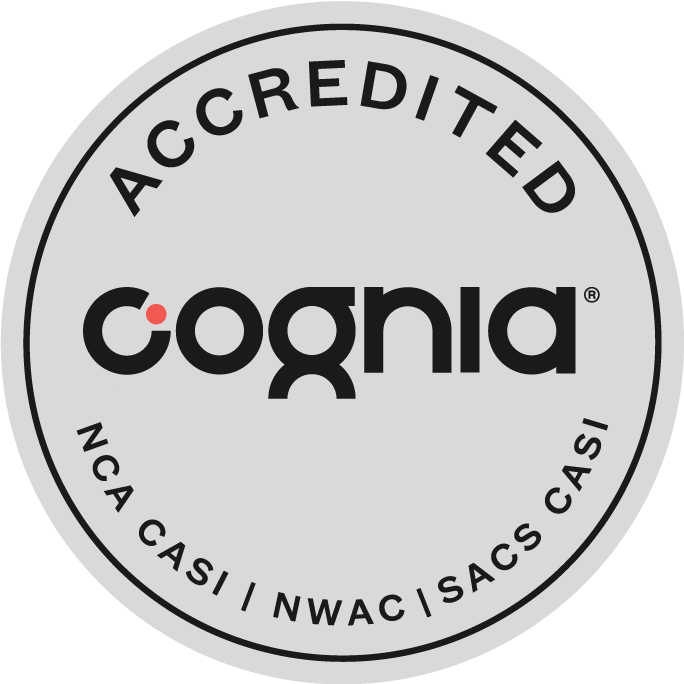Mission
Excellence Academy’s (EA) mission is to provide holistic education that helps raise the next generation of believers achieving excellence in character and excellence in academics.
Vision
The vision of the Excellence Academy is to foster excellence in children’s moral character and academic development. We are held to a higher standard by the words of the Prophet Muhammad (peace be upon him) “Verily, God decreed ihsan [excellence] on everything” (Sahih Muslim). Our curriculum accordingly is designed to develop the child to be:
- A steward of the universe
- A responsible contributor to society
- A champion of truth and an example of virtue
- Kind, just and modest
- Balanced between humility and confidence
- Creative, intellectual and proactive.

Excellence Academy is proud to announce that we are a Cognia accredited school.
Excellence Academy is proud to announce that we are using the Cambridge curriculum
We are one of just two Islamic schools in the nation (and the only Islamic school in Texas) that uses the Cambridge curriculum. For Academic Excellence, Excellence Academy is your best choice.
Our Programs
Primary School
The foundation of Montessori School of Excellence begins in the Primary classroom, with 3- to 6-year-old children.
Elementary School
The elementary program consists of both lower elementary (ages 6-9) and upper elementary (9-12).
Secondary Education
Our secondary education program serves students in grades 7-9, in-person and online.
Islamic Studies
Our Islamic studies program runs in parallel with our primary and elementary programs.
FAQ’s
What is The Montessori Method?
The Montessori Method was founded in the early 1900s by Italian physician and educator, Maria Montessori. Her scientific observations of young children led her to create a classroom where children could take full advantage of their abilities in a prepared environment of self-correcting materials that supports their inner desire to learn.
What is the difference between Montessori & Traditional education?
Learning through the senses
The Montessori Method emphasizes learning through all five senses. While traditional classrooms are teacher-directed, Montessori classrooms are student-centered. Children learn at their own individual pace and according to their own choice of self-correcting materials from several areas of study. This freedom of choice, under the directress’s guidance, allows for a comprehensive approach to learning. It builds a child’s motivation, concentration, self-discipline, and love of learning.
Montessori Classes
Montessori classes place children in three-year age groups (3-6, 6-9, 9-12, etc). Such grouping allows the older children to become natural role models while the younger children are encouraged and motivated to grow to the level of the older children. Traditional education focuses on teaching academic subjects in a fragmented manner. Montessori education has a holistic approach to education. It starts with the creation of the universe and then branches out to other subjects as they naturally develop. In Traditional education, students learn concepts abstractly without necessarily understanding their value and rationale, nor how they relate to the real world. The Montessori Method emphasizes learning through all five senses: children learn concretely and then move to abstract concepts. This allows them to not only know these abstract concepts but the basis behind them and how they can be applied in real-life situations.
What are the goals of Montessori education?
The Five basic goals of Montessori education are:
- To awaken the child’s spirit and imagination
- To encourage their normal desire for independence and a high sense of self-esteem
- To help them develop the kindness, courtesy, and self-discipline that will allow them to grow into full members of the society
- To help children learn how to observe, question, and explore ideas independently
- To create a spirit of joyful learning to help the child master the skills and knowledge of their society.
How Does Montessori Education Develop Children’s Confidence And Social Skills?
Montessori education develops confidence and a positive self-image by encouraging the children to be motivated and rewarded for their individual achievements. It develops their sense of independence and initiative by allowing them to choose their area of work and encouraging them to find out and do things for themselves.
What Is The Role Of The Montessori Teachers?
The teacher in a Montessori classroom is known as a director/directress because (s)he directs, guide, and support young children in their process of self-development. Directors are primarily keen observers with a clear idea of each individual child’s level of development. Based on their observations, they guide individual children to appropriate lessons and activities. They are trained to create a prepared, calm, respectful, and orderly environment that aids children in developing independence, self-confidence, and inner discipline.
What is Montessori’s Concept of “Freedom”?
A Montessori classroom allows a child to have “freedom within limits.” Classroom rules are established by the directress. Common rules based on the Montessori philosophy include respect for each other and the environment and children are free to work at their own pace with the materials they have been presented. The directress relies on his/her observations of the children to determine which new materials may be introduced to an individual child or to a group. Although children are allowed to choose their own work, interact with others, and walk freely around the classroom, they are also expected to follow rules of conduct. When children do not follow classroom rules and exhibit personal responsibility their freedom is limited. The directress may then play a more active role in guiding and directing the child’s behavior and work choices.
Expected Results From Montessori-Based Education
In Paula Polk Lilliard’s book, Montessori Today, a parent of a Montessori child described the Montessori experience of his children by saying: “They are competitive. All kids are, but it is different. They get along so well and they are so confident. They are almost adult-like in their attitudes toward others. They care about the world. They have even involved me in a community service project for the homeless.”
Another parent observed, “. . . these children were independent and confident in the classroom, and their creativity, happiness, and love of learning were evident. I remember being particularly surprised by the children’s unusual kindness and concern for each other and the care with which they handled the objects of their environment. In fact, I had never seen children so young behave with the same degree of self-discipline and responsibility.”
The Montessori approach will encourage the cultivation of inner motivation to succeed, and address the social-emotional needs of the students. More specifically, the Montessori Method: stimulates the growth of the whole child by following the natural developmental cycles of human beings; provides multi-age classrooms to facilitate and encourage individualized learning; encourages the child to be motivated and rewarded by his or her own individual achievement; promotes the child’s ability to find out and do things for themselves by manipulating the materials, leading to their functional independence; encourages the development of positive self-image through specialized culture-based learning activities and materials.
Is It too Difficult for a Child to Transition to Another School From a Montessori School?
Generally, transitioning from a Montessori school is not difficult, although a child’s personality and temperament plays a key role in his/her transition process. Montessori students are well prepared academically and socially. Montessori students are known for their self-confidence, independent thinking and ability to assume responsibility and leadership.

